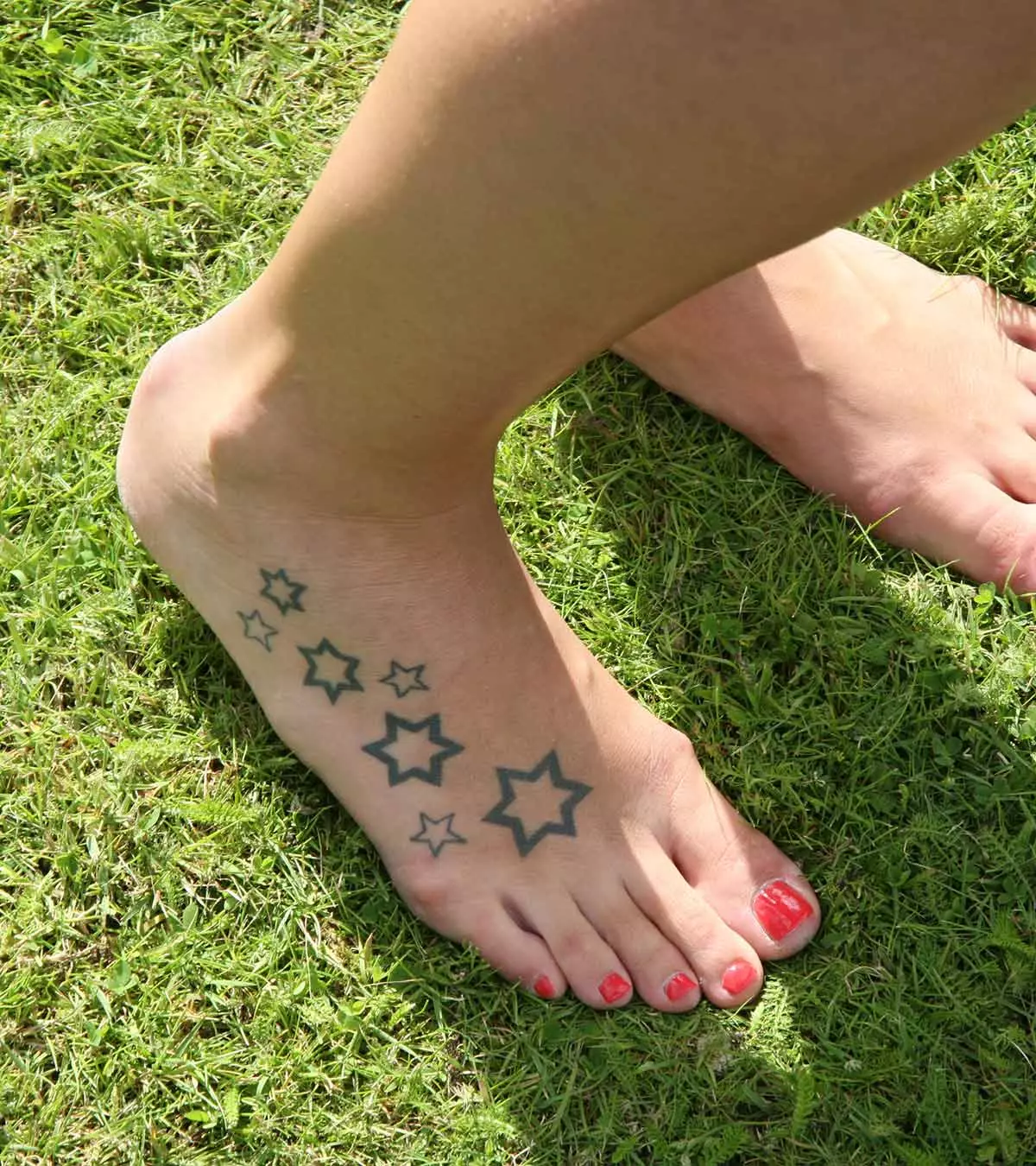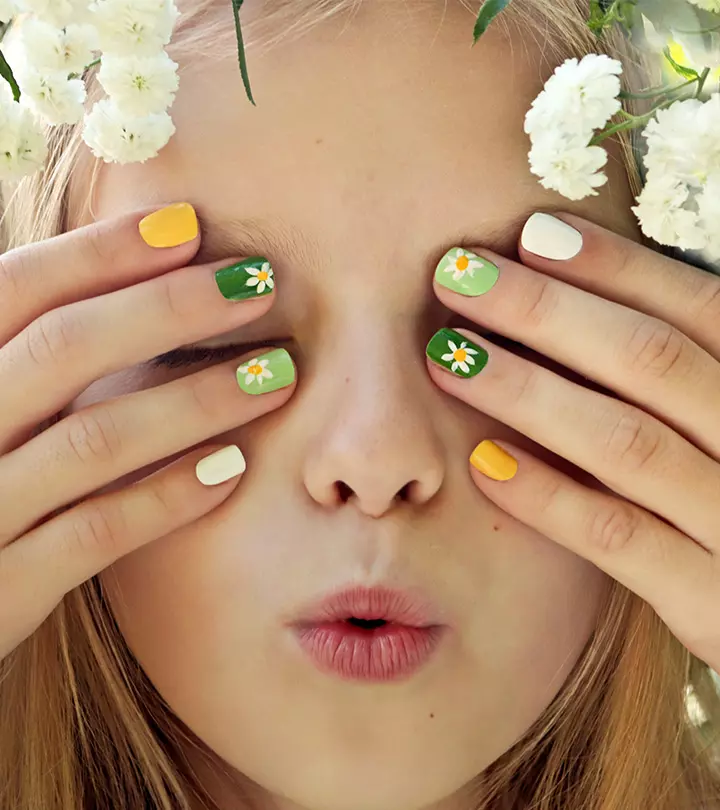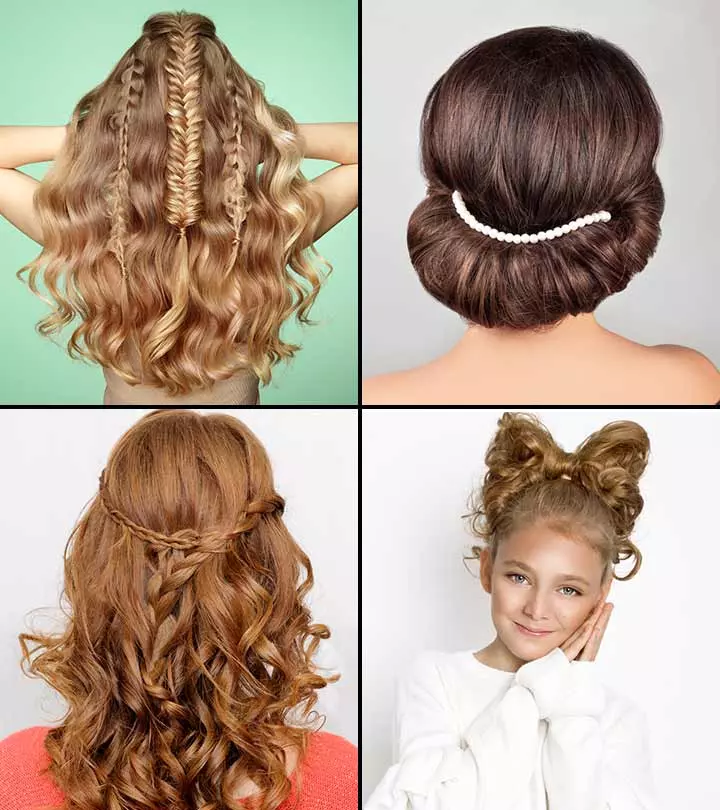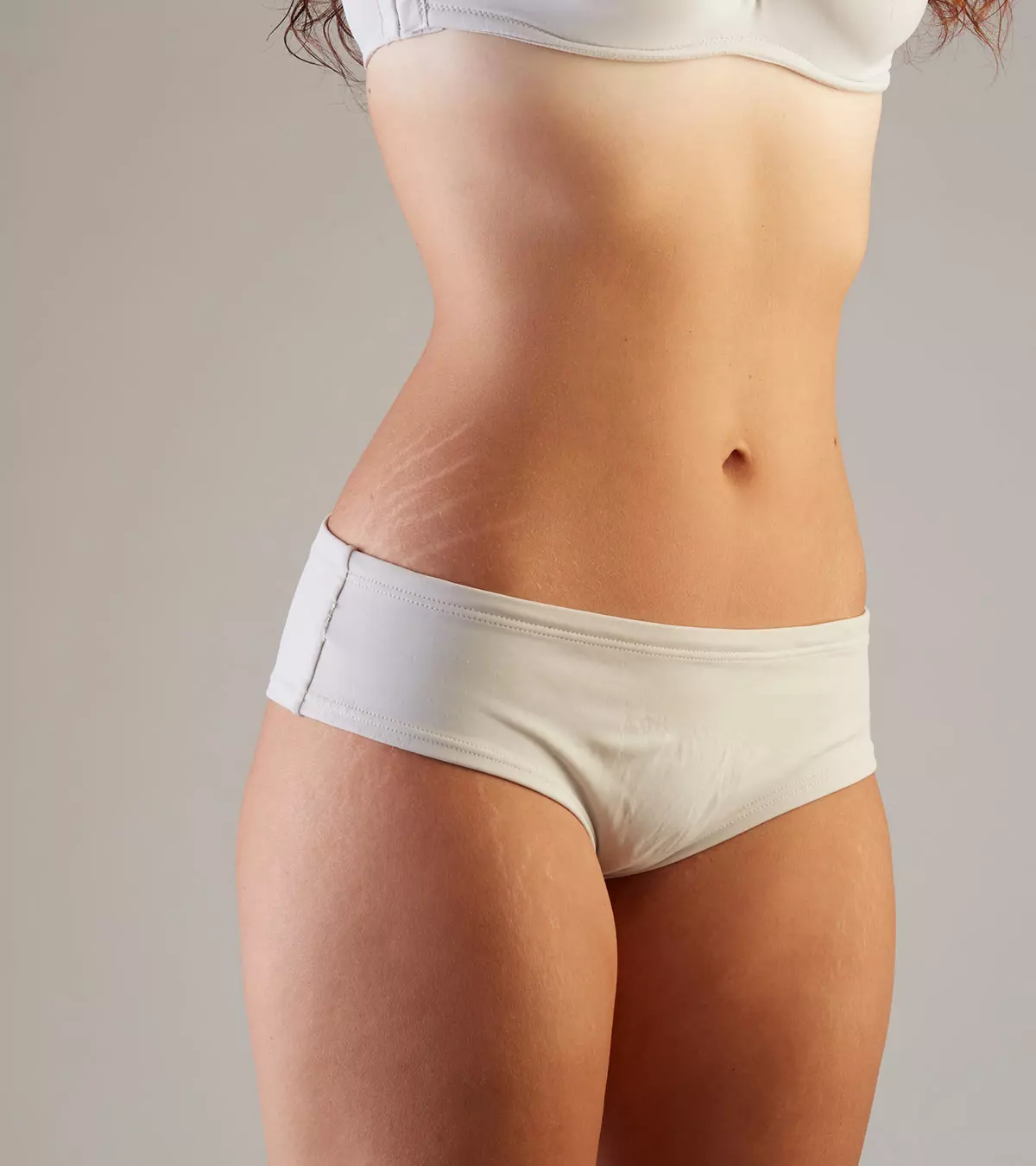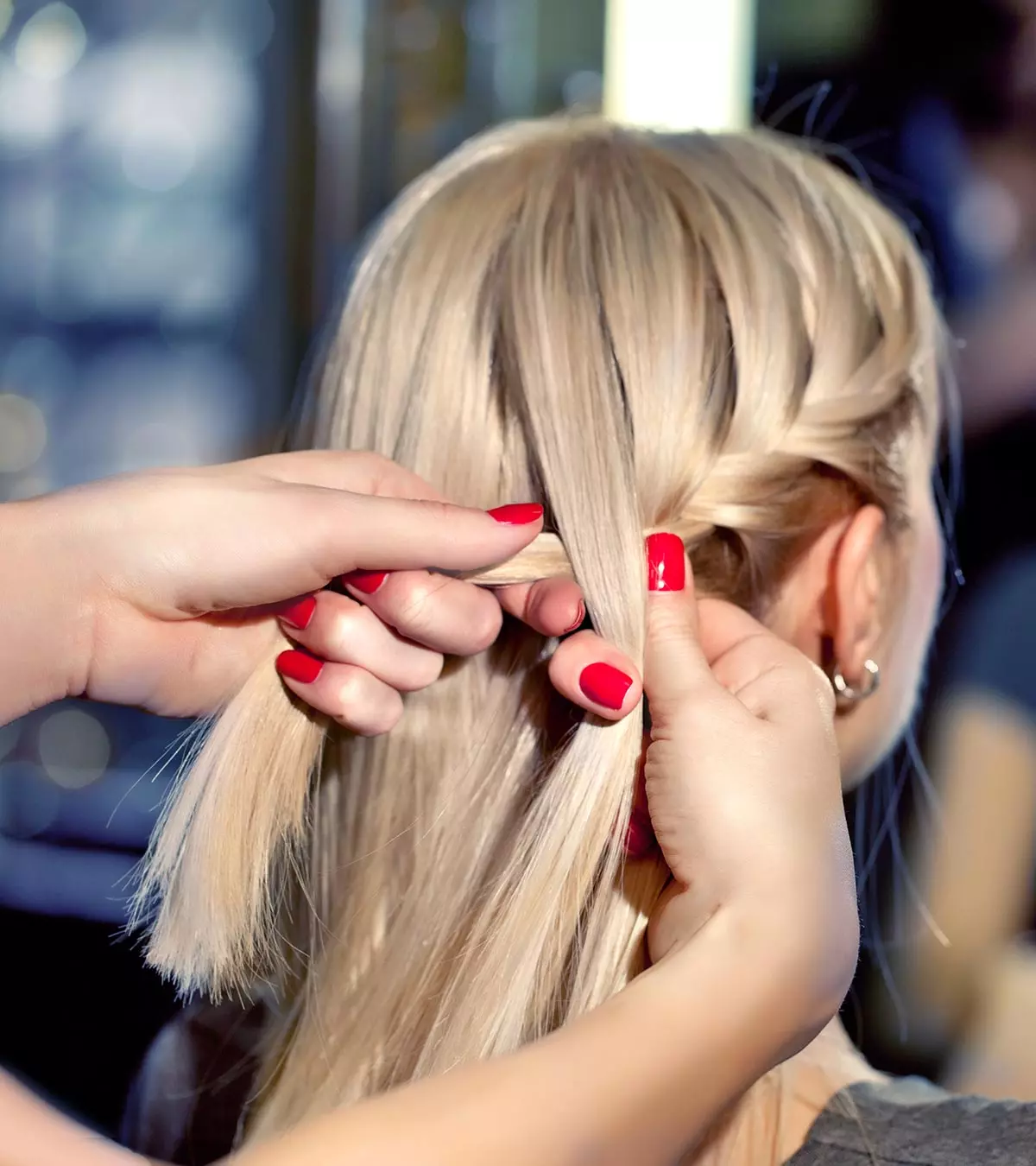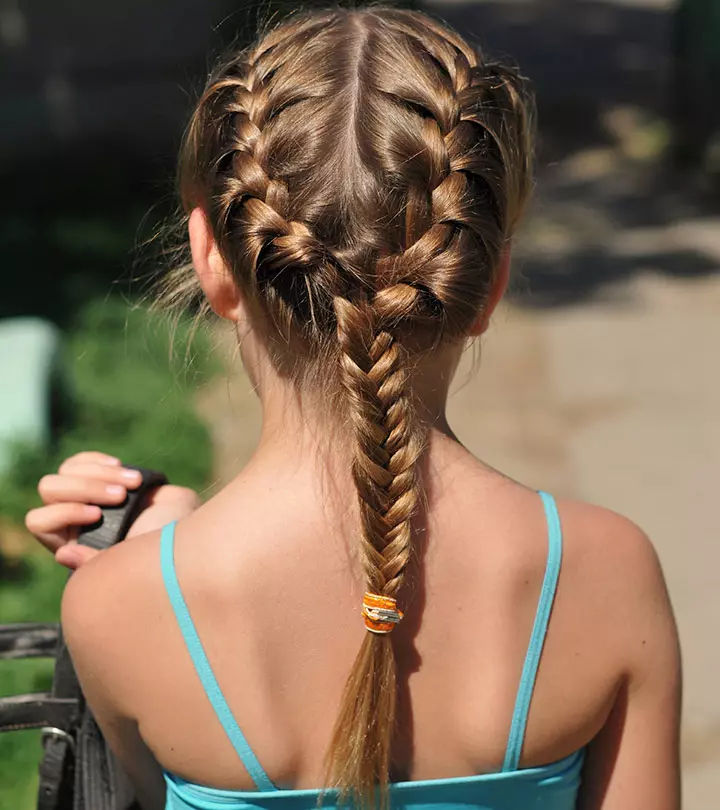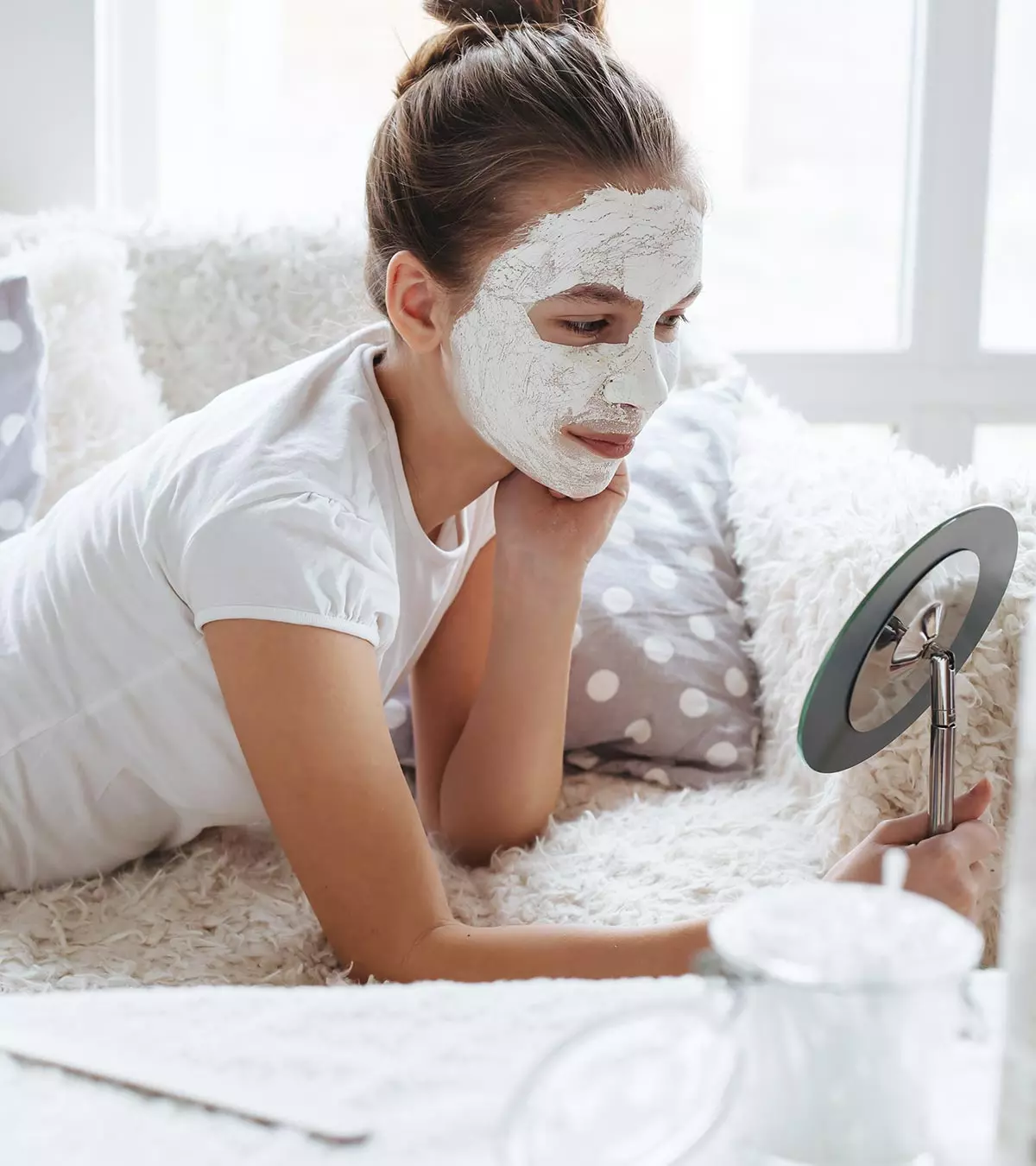
Image: Shutterstock

Surging hormones, new love interests, peer pressure, academics, and so on. Ah, teenage life is not an easy stage of life. Out of so many things to deal with on hand, skin care tips for teens are among the last things they may want to explore. Nonetheless, while dealing with numerous emotions and bodily changes, teens may experience stressful skin conditions. Therefore, indulging in some skin care could be the initial step in a teen’s long journey toward flawless and healthy skin. Keep reading as we share some useful skincare routines for keeping your skin ever-glowing and healthy.
Key Pointers
- The first step in skincare is identifying your skin type.
- Clean your skin daily with a mild cleanser to avoid stripping essential oils.
- Toning can shrink pores and rejuvenate skin, while moisturizer hydrates it.
- Use broad-spectrum sunscreen that protects against UVA and UVB rays.
What’s Your Skin Type?
Identifying the skin type correctly is crucial for developing the perfect skincare routine for you.
Typically, the skin type is determined by genetics and the climatic conditions in the area.
Skin types are categorized into oily, normal, dry, and combination skin. Keep reading to know what your skin type is.
- Normal skin is even-toned, neither oily nor dry, and pores are barely visible. This type of skin has a balanced sebum production that keeps the skin healthy.
- Oily skin is acne-prone with visible pores and a shiny surface. This type of skin produces excessive sebum, which may sometimes lead to clogged pores and frequent breakouts.
- Dry skin is dull, patchy, parched, and sometimes itchy. Lack of sebum production and dehydration may also result in dry and flaky skin.
- Combination skin is when you have a mix of both oily and dry skin. People with a combination skin type often experience an oily T-zone, which includes the forehead and nose. The cheeks and chin remain dry.
Flawless skin is not entirely dependent on the DNA. Lifestyle, diet, and skincare routine also have an effect on the skin. Therefore, regardless of the skin type, you can improve your skin health with a healthy routine.
Teenage Skin Problems
Teenage skin is prone to many problems. But when you adopt a good regime, it is possible to keep them at bay.
- Acne: It occurs when skin pores get blocked because of oil or sebum. It results in pimples (1).
- Eczema: This skin problem is characterized by rashes, itching, and irritation on the skin. If you scratch your skin, it spreads this problem (2).
- Excessive sweating: Teens who sweat excessively suffer from a condition known as hyperhidrosis. Its cause is not known, but it does impact the emotional well-being of the child (3).
- Cold sores: These are blisters around the nose, mouth, and face. Cold sores go away in about two weeks and might not need any treatment (2).
Skincare Routine For Teens: Four Simple Steps To Healthy Skin
Are you struggling to keep up with a skincare regimen? The foundation of flawless skin is a healthy skincare routine, which must be followed consistently. But how does one find time to develop a routine which is simple yet effective?
Here, we tell you about a basic skincare routine for teens.
- Cleansing:
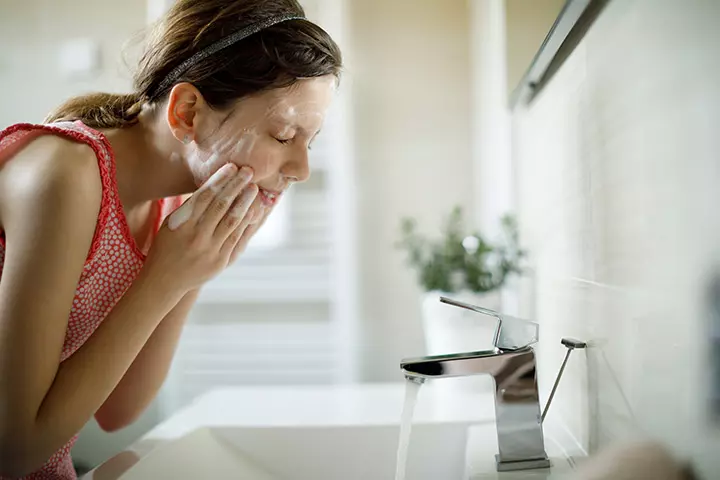
Image: IStock
The primary step of skincare is to cleanse the skin thoroughly. No matter what your skin type is, choose a cleanser with mild ingredients that will not rip off the essential oils from your skin. An oil-based cleanser is ideal for nighttime when you need to get rid of the excessive sweat, makeup, dirt, or grime from the skin. It should be followed up with a soap-free foam cleanser. For the morning routine, you can choose a gentle foam-based cleanser.
- Toning:
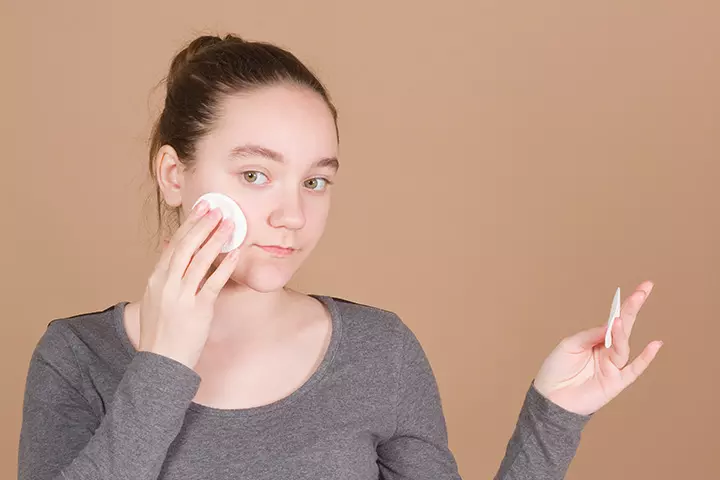
Image: IStock
Next, you tone your skin. Use a toner that helps in the shrinking of large pores. The toner helps with pore care as it cleans and closes the pores, and rejuvenates the skin. Choose the toner carefully and avoid the ones that may contain alcohol and other chemical ingredients that could harm the skin. You may consider buying toners made of plant-based ingredients that are safe and gentle on the skin.
- Moisturizing:
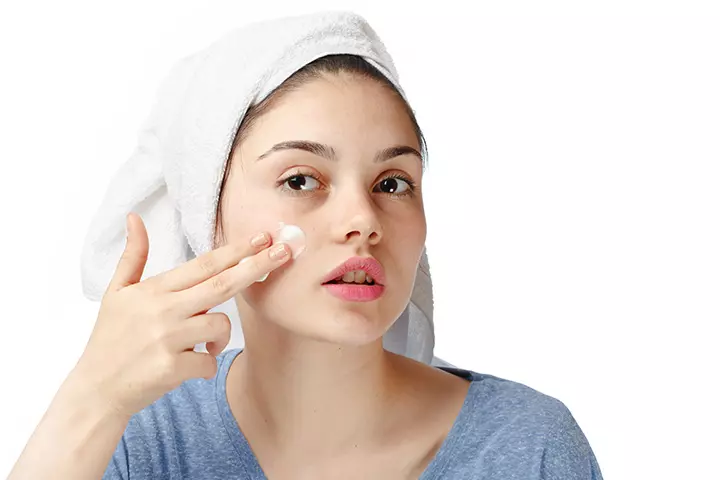
Image: IStock
The next step is to lock in all the moisture with the help of a hydrating and nourishing moisturizer. A moisturizer is like food for the skin, so choose one that is light and oil-free. The ideal moisturizer is the one that suits your skin type and helps in maintaining the right moisture levels in the skin.
- Sunscreen:
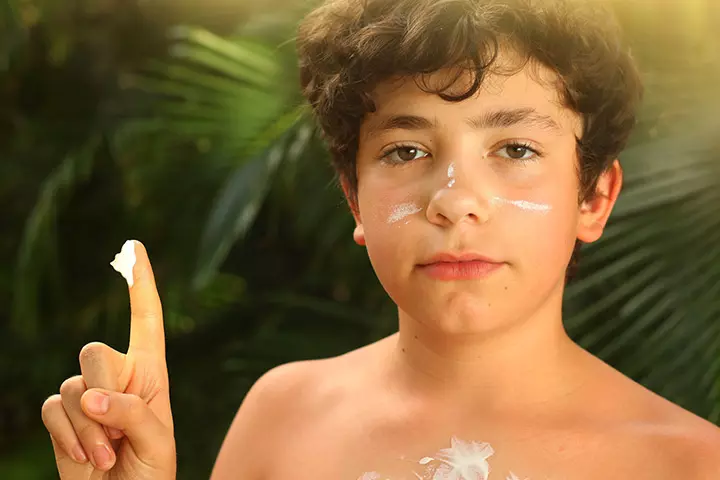
Image: IStock
The final step in your skincare is to wear sunblock. A good habit for life is to protect the skin from the harsh UV rays of the sun. Rain or shine, sunscreen is a must. If you are into sports and stay outdoors often, buy sunscreen with an SPF of more than 35. If you spend most of your time indoors, one with an SPF of 15 is good enough. Even when hitting the pool, slather generous amounts of waterproof sunscreen to avoid tanning.
A skincare routine may not be one-size-fits-all and varies from one person to another. It depends on a lot of aspects such as weather conditions, age, time of the day, and lifestyle. However, these four steps are the basis for any skincare routine and can be customized as per the requirements of your skin type.
Keep reading as we tell you why every teenager needs a good skincare regimen.
Benefits Of A Good Skincare Regime
It’s crucial to establish a routine of personal hygiene for teenagers. No amount of designer wear or fancy shoes can hide damaged skin, because the face is the first thing that people notice. A good skincare routine plays a significant role in promoting healthy skin, in spite of the hormonal changes that you go through at this age.
Also, building a skincare regime proves fruitful in the long run. Some benefits of teenage skin care are discussed below.
- Keeps skin clean and fresh: An everyday skincare ritual ensures that the skin is clean and feels fresh all the time. It removes all the dirt and grime, unclogs pores, and eliminates the dead skin.
- Reduces stress: Healthy and glowing skin boosts an individual’s confidence. This helps in reducing stress levels and strengthens the skin’s immune system as well.
- Delays aging: Research suggests that a good skincare regime is beneficial in delaying the aging process (4). The earlier one starts, the better it is. Pollution, fast-paced lifestyles, and the lack of nutritious food can cause a lot of damage to the skin inside and out, even for teenagers. A skincare regime helps in combating these problems and delays the signs of aging.
- Keeps your skin hydrated: The importance of hydration and moisturizing cannot be stressed enough. Drinking enough water helps maintain the elasticity of your skin and keeps it healthy.
The skin is the largest barrier against infections or diseases. A good skincare regime also helps in keeping this protective layer on our body safe.
Skincare Tips For Teens
It is hard but not impossible to deal with raging hormones and take care of your skin at the same time. Here are a few skincare tips for teens to use.
- Do you know how many times you touch the face during the day? You may not keep a count of it, because most of the time, you do it unknowingly. So to avoid scars and prevent more pimples from popping up, try to keep your hands away from your face. Also, keep your nails clipped.
If you have acne-prone skin, then picking or popping pimples on the face is also a strict no-no, no matter how badly you want to get rid of them. To effectively treat active acne, it is advisable to consult a dermatologist. Depending on the severity of the condition, they may suggest the use of cleansing brushes, retinoid creams, or other courses of treatment. They may also recommend non-comedogenic products that help prevent breakouts.
- Water therapy works wonders for all skin types. Water contains nutrients that are good for your overall health. It helps in detoxifying and keeping the gut clean, which reflects on your skin. Ideally, a person must drink at least eight glasses of water a day.
- Exfoliating once a week helps in the removal of dead skin and blackheads. When you exfoliate your skin, it becomes soft and supple. Take extra care during exfoliation or scrubbing the skin, especially if your skin is sensitive or you have pimples. Avoid chemical-laden exfoliating agents; stick to gentle and natural scrubs. Adding facial steaming prior to exfoliation and following exfoliation up with a moisturizing mask may benefit your skin.
- A balanced diet that includes raw fruits, veggie salads, and healthy juices can nourish the skin. The more colorful your plate, the better it is. Just make sure you don’t include any foods that you are allergic to.
- Cleansing, toning, and moisturizing are three steps that you must include in your morning and night skincare routines. This helps in maintaining your skin’s good health.
- Keep the makeup minimal and avoid products with harsh chemicals. Opt for fragrance-free products. Sometimes makeup products damage the skin further. Therefore, buy lightweight products that are safe, and do not forget to perform a patch test before applying anything on the face.
- If you have a skin problem, regular visits to a good dermatologist can help you stay informed about your skin health. They can provide personalized advice and treatment options that suit your skin type.
- Do not go to bed without removing the makeup. You may be tired and exhausted after a long day at school or college, but you must take the makeup off before hitting the sack. Sleeping with makeup on is inviting various skin infections. It takes ten minutes or less to take off the makeup and cleanse the face thoroughly. Using makeup removal wipes makes the job even easier.
- A smile is an accessory that enhances beauty. Your lips are a part of your face and must not be ignored during the skincare regimen. Every once in a while, scrubbing the lips is important. After that, use a nourishing lip balm to moisturize them. Avoid wearing lipsticks that may dry and crack your lips.
- Sunblock is a must. Wearing sunscreen with a good SPF helps our skin combat the damage that the UV rays cause. Choose a sunscreen based on your activities for the day and apply it at least 30 minutes before heading out. You can look for sunscreen with Vitamin C as it helps protect against pollution and brightens the skin.
- Sleep is equally important. Did you know, the skin repairs itself while we are asleep? Our body calms down, and the skin rejuvenates itself during your sleep. Therefore, you must get enough sleep, at least eight to nine hours, every night. Occasionally, you can use a sleeping mask to moisturize and hydrate your skin through the night.
We now know how important skincare is and the benefits it offers. Gen Z, too, understands the importance of skincare, and hence there has been a surge in expenditure on skincare products over the last few years. According to a survey by Minneapolis-based investment bank Piper Sandler, 38% of American girls in the 13-18 age group said they increased their spending on skincare and cosmetic products in fall 2018.

Percentage of teenage girls spending more on skincare products
Source: US teens swap handbags for beauty products; Vogue Business/Piper SandlerFrequently Asked Questions
1. At what age should I start a skincare routine?
A good skincare routine can delay signs of aging, protect your skin barriers, and keep your skin healthy. You may start with a basic CTM routine as you enter the preteen phase and can customize the routine depending on your skin concerns (2).
2. How can I identify my skin type?
Cleanse your face to figure out your skin type. Pat it dry and leave it for around 30-40 minutes. You have an oily skin type if you see oily buildup in the area surrounding your T-zone. You may have dry skin if it stays dry or becomes flaky. Additionally, if you have a dry forehead and cheeks but an oily T-zone, you have combination skin.
3. How often should teens wash their faces?
Teenagers can wash their face twice daily to maintain clean and healthy skin. Nevertheless, the appropriate frequency may differ based on skin type, physical activity levels, and specific health conditions. It is essential to determine a suitable routine that suits their skin by seeking guidance from a dermatologist (5).
4. How can teens take care of their skin during the summer?
Applying sunscreen with SPF, limiting sun exposure, wearing protective clothing, staying hydrated, cleansing the face twice daily, using lightweight and oil-free moisturizers, and engaging in regular exfoliation to eliminate sweat, dirt, and dead skin cells are effective skin care methods for the summer season.
5. What are some common mistakes that teens make with their skincare?
Teens often make common mistakes in their skincare routine, such as excessive scrubbing, using harsh chemicals and products not suited for their skin type, not applying sunscreen, engaging in pimple picking or popping, and lacking consistency in their skincare regimen.
6. How can teens choose the right skincare products for their skin type?
Teens can select appropriate skin care products by determining their skin type (oily, dry, combination, or sensitive) and choosing gentle cleansers, moisturizers, and products that address their specific concerns. They should read product labels, seek professional guidance, and perform patch tests before using a skincare product.
7. Why is it important to patch-test new skincare products before use?
You can’t always tell if a new product will work for your teen. A patch test helps check if it’s safe for their skin. Ask them to apply a small amount on a small area of their skin and wait 24 hours to see if there’s any reaction. If it causes irritation or an allergy, it’s not right for them.
Skincare tips for teens can help them overcome skin issues caused by hormonal changes in puberty. Self-care for teens involves not only maintaining a skincare routine but also addressing overall well-being to support healthy-looking skin. Taking good care of their skin can give your child healthy-looking skin, boosting their confidence levels. Adequate care can also keep their skin clean and hydrated and prevent premature aging. It is essential to know their skin type to choose the right products and care routines. Cleansing, toning, moisturizing, and sun protection are the basic steps of routine skin care. It is also important that they eat a well-balanced diet, exercise regularly, reduce stress, and get good sleep for healthy skin.
Infographic: Essential Points About Teen Skincare
As children step into adolescence, they experience various hormonal and bodily changes. Therefore, parents must teach teens proper skincare routines for smooth and healthy skin. Read through the following infographic for valuable tips about skincare. Save and share it with your teen.
Some thing wrong with infographic shortcode. please verify shortcode syntaxIllustration: Essential Skin Care Tips For Teenagers To Look Healthy

Image: Dall·E/MomJunction Design Team
Get flawless skin with this easy teen skincare routine that keeps your skin healthy and glowing. Learn simple steps for cleansing, moisturizing, and protecting your skin.
References
1. Teen Acne: How to Treat & Prevent This Common Skin Condition; Healthychildren.org
2. Infections (for teens); Connecticutchildrens.org
3. Is Your Teen Sweating Too Much?; Health.choc.org
4. Ruta Ganceviciene et al; Skin anti-aging strategies; Dermatoendocrinol (2012)
5. Skin Care for Children and Teens; Boys Town Pediatrics
6. Why you should add toner to your skincare routine; Gundersen Health System
7. Can The Right Diet Get Rid Of Acne?Academy of Dermatology Association
8. How Often Should Your Kids Take a Bath or Shower?; Cleveland Clinic
Community Experiences
Join the conversation and become a part of our nurturing community! Share your stories, experiences, and insights to connect with fellow parents.
Read full bio of Dr. Deepak Jakhar
Read full bio of Dr. Ritika Shah
Read full bio of Harshita Makvana
Read full bio of Ghazia Shah








